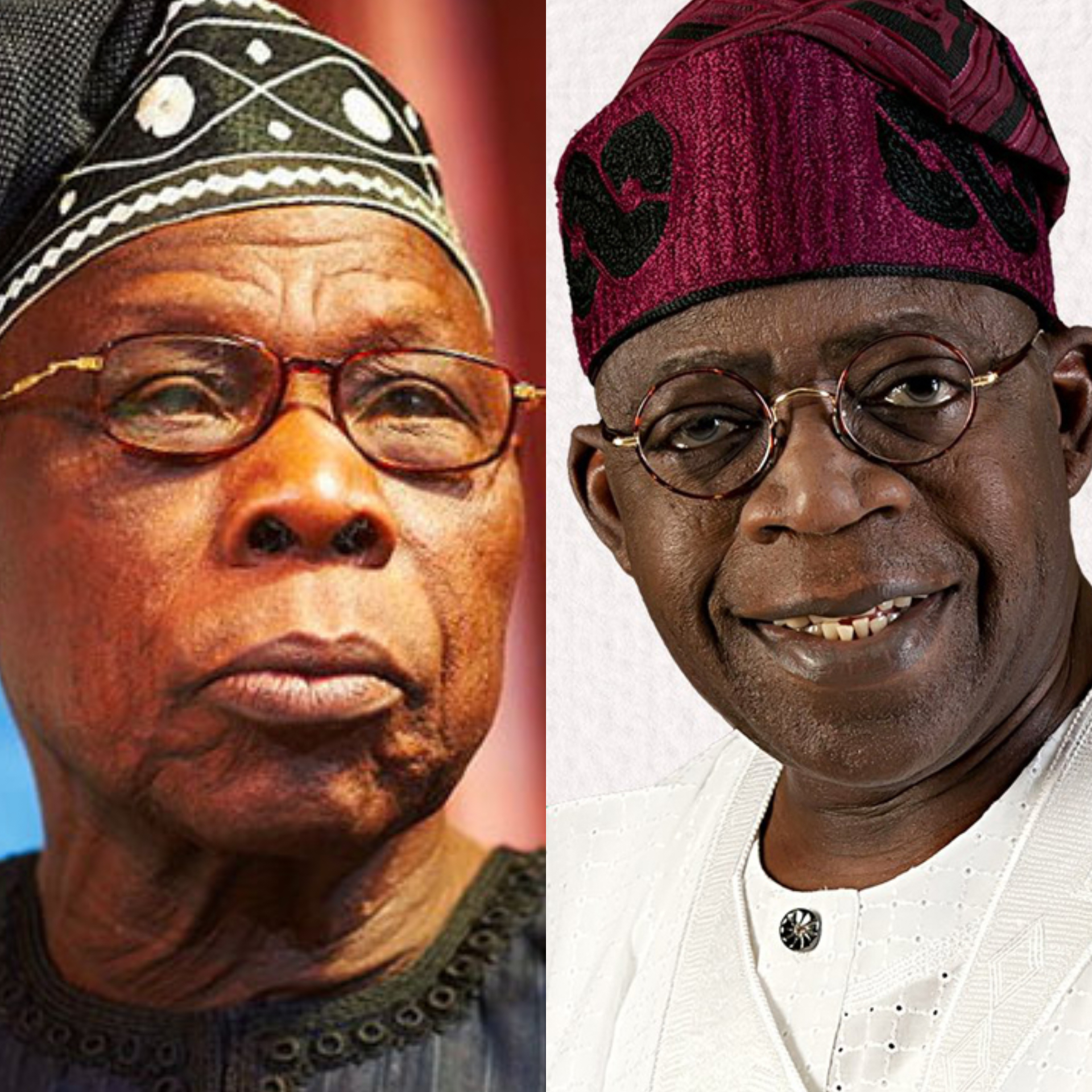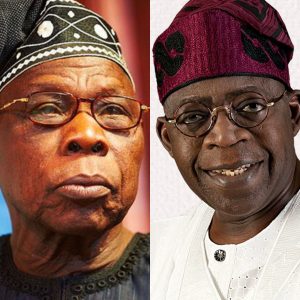Olusegun Obasanjo, Bola Tinubu
By Our Reporter
Nigeria’s former President, Olusegun Obasanjo, has criticised the administration of President Bola Tinubu over poor implementation of the removal of subsidy from petroleum products, handling of the Niger coup and the floating naira.
Obasanjo said though the policies were necessary, they were wrongly implemented.
Obasanjo revealed these in a statement made available to newsmen on Sunday by his Special Assistant on Media, Kehinde Akinyemi.
The former President spoke in Abuja at the weekend during a colloquium tagged: “Nigeria’s Development: Navigating the Way Out of the Current Economic Crisis and Insecurity.”
Obasanjo said, “Today, the government has taken three decisions, two of which are necessary but wrongly implemented and have led to the impoverisation of the economy and of Nigerians. These are the removal of subsidy, closing the gap between the black market and official rates of exchange and the third is dealing with a military coup in Niger Republic.
“The way forward is production and productivity which belief and trust in government leadership will engender. No shortcut to economic progress but hard work and sweat.
“The economy does not obey orders, not even military orders. I know that. If we get it right, in two years, we will begin to see the light beyond the tunnel. It requires a change of characteristics, attributes, and attitude by the leadership at all levels to gain the confidence and trust of investors who have alternatives.”
Obasanjo added that the government must do more to attract foreign investments. He said, “Total Energy has gone to invest $6bn in Angola instead of Nigeria. If the truth must be stated, the present administration has not found the right way to handle the economy to engender confidence and trust for investors to start trooping in.
“They know us more than we know ourselves. And now they are laughing at us, not taking us seriously. We have to present ourselves in such a way that we will be taken seriously. If the existing investors are disinvesting and going out of our country, how do we persuade new investors to rush in?
“We can be serious if we choose to be but we need to change from transactional leadership in government to transformational and genuine servant leadership.
“With change by us, the investors will give us benefit of doubt, and security being taken care of on a sustainable long-term basis, they will start to test the water.
“ With the right economic policies, attribute of integrity and honesty of purpose, all should be well with all hands on deck and government becomes a catalyst for development, growth and progress.
To conclude on the economy, “tinkering with the exchange rate is not the answer. The answer is consistency and continuity in policy to ensure stability and
predictability. That way, we will be sure to incentivize domestic and foreign investment.
“There must be honesty and transparency in government dealings and contracts and not lying with deception about these issues. When the government is seen as pursuing the right policy, the private sector will go for production and productivity.”
“Change is possible but it must begin with the leadership”.
Obasanjo’s reaction to the refinery issue was coming barely six months after the claim that the refinery would begin operation in January.
He noted that to get out of the current situation of the country, the government and the governed needed to look at the past and the present, and ask: How do we get here?
“Looking at the topic of today’s occasion, the question I would ask is, how do we navigate our way out of these crises and pave the path towards a more secure and prosperous Nigeria? I believe the answer to this requires a multi-faceted approach that addresses the root causes of these challenges. The central questions are: where were we? And how did we get to where we are today?
According to Obasanjo: “Firstly, we must know where we are coming from. Our economy has consistently suffered from poor policies, lack of long-term sustainable policies, discontinuity, adhocry, and corruption firmed on personal greed, avarice, incompetence, lack of knowledge and understanding, and lack of patriotism.
“For instance, the statement and proposed actions given forty-five years ago to stop fuel scarcity is the same statement and action being touted today. I recall when I made the statement that the refineries would not work, the sycophants and spin doctors of this current administration went out to castigate me as not being a petroleum engineer and that I did not know what I was talking about.
“They forgot that the attempt that was made in 2007 to partly privatise the refineries was made by me after a thorough study of the situation. But the decision was reversed by my successor and the 750 million dollars paid was refunded.”
On a way out, the former President said the country needed “a 25-year socio-economic development agenda that will be generally agreed to, by the nation of all political parties and passed into law by the National Assembly with State Assembly aspects also passed into law by the State Houses of Assembly. We take up the implementation on a five-year basis. In reality, that plan will have the effect of almost a Constitution. The first priority in the implementation will be education for all.”
On the security, he said, “We need a stick-and-carrot approach. Stick to deal with those who cannot be weaned out of criminality and evil deeds and for those weaned, they should be rehabilitated.
“There should be no Nigerian without being in school compulsorily for eleven years – secondary education level.
“Employment must be a right for all Nigerians from age 18 years to 65 years.
“With such a carrot in position, the stick must then be made more severe for criminals. Five years must be set out to ensure that every Nigerian child that is not in school is in school and no one is left out of popular education”.


